Daily Vocabulary Words: List of Daily Used Words
Hi there. Welcome to this special section @ Wordpandit.
Our endeavour here is straightforward: highlighting important daily vocabulary words, you would encounter in The Hindu. This is your repository of commonly used words; essentially, we are posting a list of daily used words. Hence, this has significant practical application as it teaches you words that are commonly used in a leading publication such as The Hindu.
Visit the website daily to learn words from The Hindu.
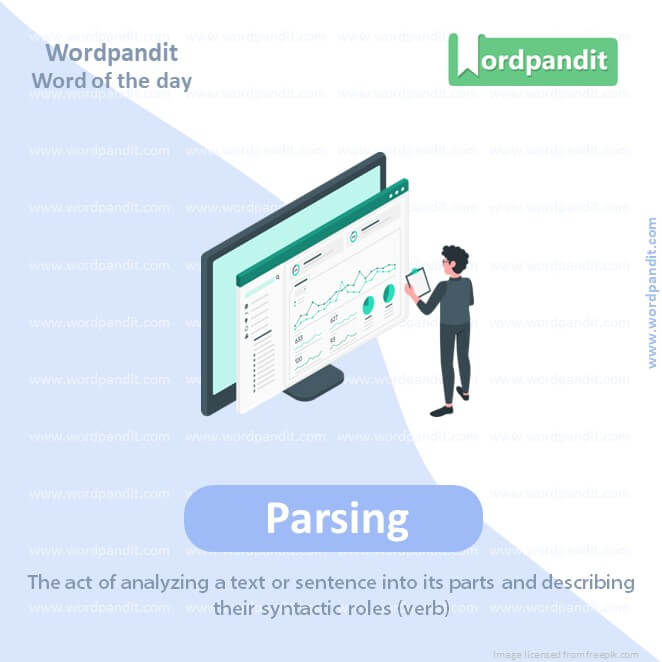
WORD-1: Parsing
CONTEXT: The turnout seems to be lower in Kerala, Madhya Pradesh, Maharashtra and Rajasthan too, but any parsing of the reasons should wait for comprehensive post-poll surveys.
SOURCE: The Hindu
EXPLANATORY PARAGRAPH: Imagine you have a big puzzle with lots of pieces. To solve it, you need to look at each piece and figure out where it goes. “Parsing” is a bit like that but with sentences. It’s looking at each word in a sentence and figuring out how they all fit together to make sense.
MEANING: The act of analyzing a text or sentence into its parts and describing their syntactic roles (verb).
PRONUNCIATION: PAHR-sing
SYNONYMS: analyzing, dissecting, breaking down, interpreting, decoding
USAGE EXAMPLE:
1. The computer program is good at parsing complex sentences.
2. Parsing the legal document took hours.
3. She taught the students how to parse sentences in English class.
4. Parsing the code helped find the error.
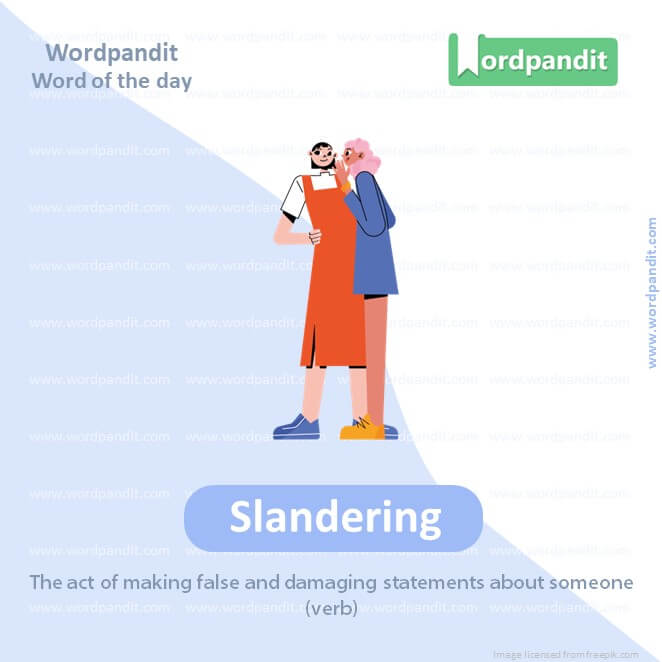
WORD-2: Slandering
CONTEXT: Modi to take to slandering the grand old party’s manifesto, particularly its emphasis on welfare, using familiar communal tropes.
SOURCE: The Hindu
EXPLANATORY PARAGRAPH: Imagine if someone told a lie about your friend that made others think badly of them. That’s what “slandering” is. It’s when someone says untrue things about another person to make them look bad.
MEANING: The act of making false and damaging statements about someone (verb).
PRONUNCIATION: SLAN-dur-ing
SYNONYMS: defaming, libeling, smearing, vilifying, maligning
USAGE EXAMPLE:
1. He was accused of slandering his competitor to gain an advantage.
2. Slandering someone’s reputation can have serious consequences.
3. The article was criticized for potentially slandering a public figure.
4. She sued for damages after being slandered in the press.
WORD-3: Swayed
CONTEXT: It remains to be seen whether the electorate will be emotionally swayed by this rhetoric or logically match it against its expectations of better jobs and livelihoods.
SOURCE: The Hindu
EXPLANATORY PARAGRAPH: Imagine you’re trying to decide which ice cream flavor to pick, and your friend tells you chocolate is the best. If you then choose chocolate because of your friend, you were “swayed” by them. It means to be influenced or changed by someone else’s opinion.
MEANING: Influenced or controlled by others or by external forces (verb).
PRONUNCIATION: SWAYD
SYNONYMS: influenced, persuaded, moved, convinced, affected
USAGE EXAMPLE:
1. He was swayed by her argument to change his vote.
2. The crowd was swayed by the speaker’s passionate speech.
3. Her decision was swayed by the latest research.
4. The jury was swayed by the evidence presented at the trial.
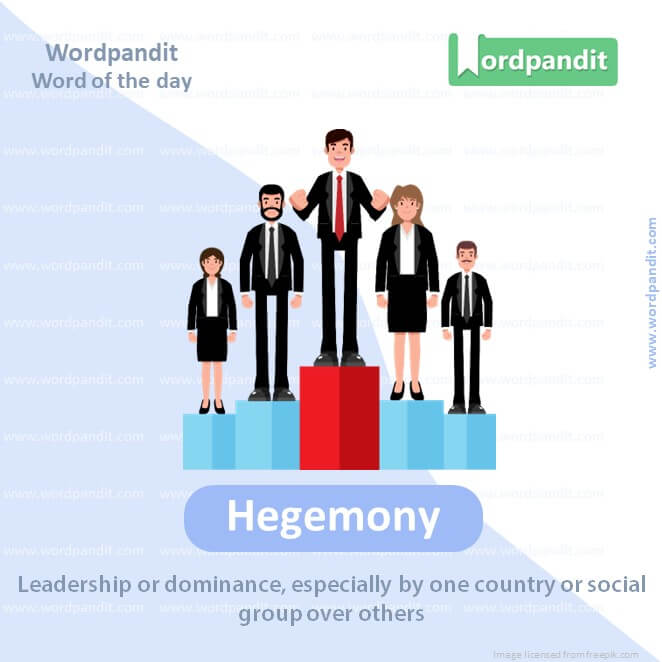
WORD-4: Hegemony
CONTEXT: The BJP, then, successfully managed to upend these parties by mobilising sections of the OBCs, who felt left out due to the hegemony of select intermediate castes in the Mandal parties, besides using Hindutva to form a solid base of support.
SOURCE: The Hindu
EXPLANATORY PARAGRAPH: Imagine a leader in a game who makes all the rules and everyone else has to follow them. “Hegemony” is like being the top leader in a group or place where everyone else looks up to you and follows your lead.
MEANING: Leadership or dominance, especially by one country or social group over others.
PRONUNCIATION: huh-JEM-uh-nee
SYNONYMS: dominance, supremacy, authority, control, command
USAGE EXAMPLE:
1. The country maintained its hegemony in the region for decades.
2. The company’s hegemony in the tech industry is noticeable.
3. Cultural hegemony affects how societies develop their norms.
4. The hegemony of the ruling party was evident from their influence.
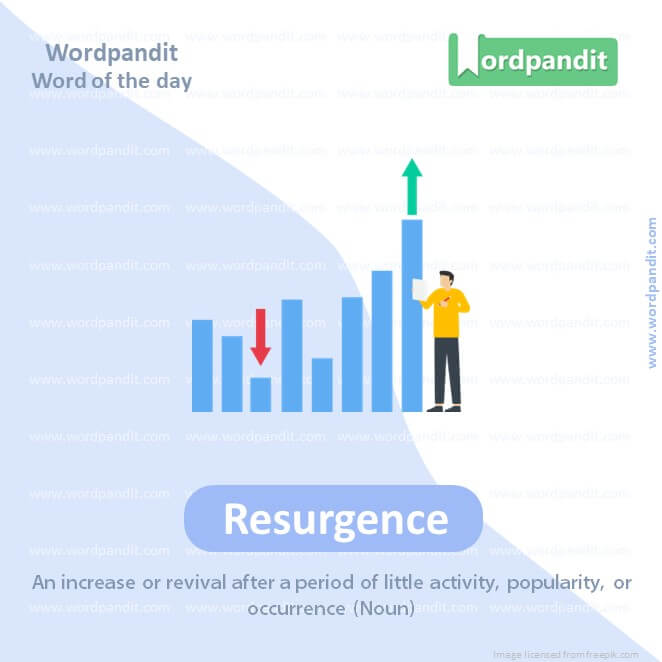
WORD-5: Resurgence
CONTEXT: the Congress seeks to revive itself in alliance with the Mandal parties who also seek a new resurgence.
SOURCE: The Hindu
EXPLANATORY PARAGRAPH: Imagine your favorite superhero who gets knocked down but then stands up stronger and ready to fight again. That’s what “resurgence” means. It’s when something becomes popular or strong again after a period of being less so.
MEANING: An increase or revival after a period of little activity, popularity, or
occurrence (Noun).
PRONUNCIATION: re-SUR-jens
SYNONYMS: revival, renewal, comeback, rebirth, rejuvenation
USAGE EXAMPLE:
1. There’s been a resurgence of interest in vinyl records.
2. The team showed a resurgence in the second half of the game.
3. Economic resurgence is vital after the recession.
4. The resurgence of the movement caught many by surprise.
WORD-6: De-anchoring
CONTEXT: They ominously add that ‘if inflation hysteresis gets entrenched, it may lead to a de-anchoring of inflation expectations, and the undermining of the central bank’s credibility would warrant higher interest rates to curb inflation, leading to greater output loss’.
SOURCE: The Hindu
EXPLANATORY PARAGRAPH: Imagine your toy boat is tied to a dock so it doesn’t float away. If you untie it, the boat starts to move freely on the water. “De-anchoring” is like that but for ideas. It’s when thoughts or beliefs that were once fixed in your mind start to change and you begin to think differently.
MEANING: The act of releasing from a fixed or established position; detaching from previous beliefs or standards (verb).
PRONUNCIATION: dee-AN-ker-ing
SYNONYMS: detaching, unmooring, freeing, releasing, liberating
USAGE EXAMPLES:
1. The lecture was about de-anchoring from traditional marketing strategies.
2. Personal growth often involves de-anchoring from old habits.
3. The policy aimed at de-anchoring inflation expectations.
4. De-anchoring from past experiences can be challenging.
WORD-7: Ominously
CONTEXT: They ominously add that ‘if inflation hysteresis gets entrenched, it may lead to a de-anchoring of inflation expectations, and the undermining of the central bank’s credibility would warrant higher interest rates to curb inflation, leading to greater output loss’.
SOURCE: The Hindu
EXPLANATORY PARAGRAPH: Imagine you’re watching a cartoon, and suddenly the music turns spooky and you know something scary is about to happen. When something is “ominously,” it means it feels or looks like something bad or scary might happen soon.
MEANING: In a way that suggests that something bad is going to happen (adverb).
PRONUNCIATION: OM-i-nuhs-lee
SYNONYMS: threateningly, menacingly, forebodingly, sinisterly, darkly
USAGE EXAMPLES:
1. The clouds gathered ominously overhead.
2. He spoke ominously about the future of the planet.
3. The door creaked ominously in the old house.
4. She looked at him ominously before revealing the secret.
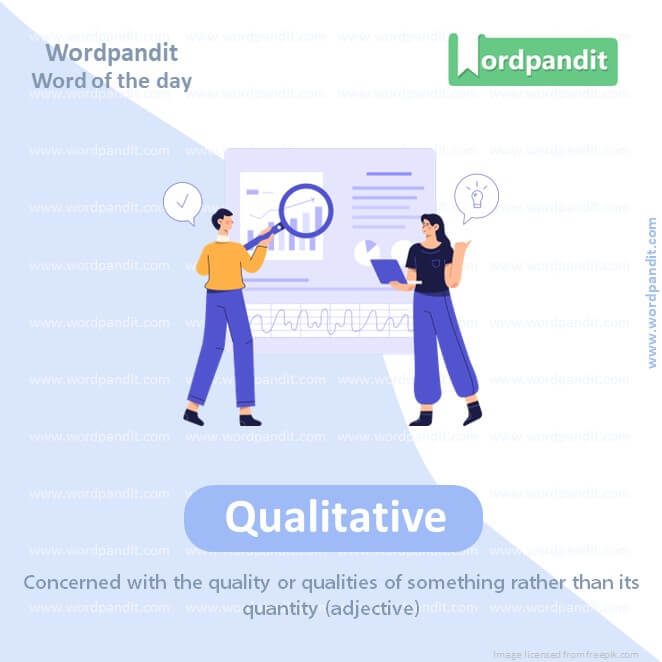
WORD-8: Qualitative
CONTEXT: the RBI must undertake a thorough-going assessment on the quantitative and qualitative impact on economic and financial stability due to climate change.
SOURCE: The Hindu
EXPLANATORY PARAGRAPH: Imagine you are choosing between two cookies—one looks really yummy because it’s big and has lots of chocolate chips, and the other is plain. “Qualitative” means looking at the quality of things, not just the number or size, like choosing the tastier cookie, not just the bigger one.
MEANING: Concerned with the quality or qualities of something rather than its quantity (adjective).
PRONUNCIATION: KWAL-i-tay-tiv
SYNONYMS: subjective, descriptive, evaluative, diagnostic, interpretative
USAGE EXAMPLES:
1. The research focused on qualitative data from the interviews.
2. He provided a qualitative analysis of the company’s culture.
3. Qualitative methods can offer deeper insights than quantitative ones.
4. The qualitative change in her attitude was noticeable.
WORD-9: Fragmented
CONTEXT: It must encourage administrative consultation to begin populating a layered green taxonomy that is reflective of India’s fragmented developmental trajectories.
SOURCE: The Hindu
EXPLANATORY PARAGRAPH: Imagine you have a big cookie, and it breaks into many small pieces. Now, it’s not just one big cookie but lots of little pieces. “Fragmented” means something that has broken into parts, or when things are not together but spread out and separate.
MEANING: Broken into pieces; divided into parts (adjective).
PRONUNCIATION: FRAG-ment-ed
SYNONYMS: broken, divided, shattered, disintegrated, dispersed
USAGE EXAMPLES:
1. The community was fragmented by conflicting opinions.
2. His attention was fragmented by constant interruptions.
3. The fragmented pieces of the vase were scattered on the floor.
4. The market for the product is highly fragmented.
WORD-10: Taxonomy
CONTEXT: A green taxonomy is a framework to assess the sustainability credentials and possible ranking of an economic activity.
SOURCE: The Hindu
EXPLANATORY PARAGRAPH: Imagine you have a big box of toys and you decide to organize them. You put all the action figures in one section, cars in another, and dolls in a different one. “Taxonomy” is a fancy word for sorting things into groups or categories so they are easier to find and understand.
MEANING: The practice and science of classification, especially of organisms; a system of naming and organizing things into groups (noun).
PRONUNCIATION: tak-SAHN-uh-mee
SYNONYMS: classification, categorization, organization, arrangement, systematization
USAGE EXAMPLES:
1. The taxonomy of plants can be quite complex.
2. He developed a new taxonomy for the software products.
3. Learning the basics of taxonomy is essential for biology students.
4. The museum updated its taxonomy to reflect recent scientific discoveries.
Vocabulary Words with Meaning
Penetrating the rich tapestry of language, the essence of ‘vocabulary words with meaning’ is a crucial aspect. It’s these seeds of knowledge that bud into fluent conversations and comprehensive understanding. The knack of grasping ‘vocabulary words with meaning’ is pivotal in language learning, but it demands a nuanced approach and strategy.
Learning ‘vocabulary words with meaning’ isn’t about mechanically memorizing heaps of words. It’s about building connections and creating a profound understanding of these words. A promising approach to assimilate ‘vocabulary words with meaning’ involves utilizing a wide range of resources including literature, films, music, and digital content. This immersion provides a broad context and diverse settings for these words, simplifying their comprehension and use.
When you’re focusing on ‘vocabulary words with meaning’, remember to incorporate memory-enhancing techniques into your learning regimen. Tools like flashcards or recall-based applications can aid significantly in long-term retention of these words. Additionally, mnemonic strategies, associating words with distinctive images or stories enhance memory recall and understanding.
The journey of mastering ‘vocabulary words with meaning’ also benefits greatly from practice and application. Engage in conversations using the language, express your thoughts in writing, and try to incorporate newly learned words into your routine. This not only enhances your familiarity with the words but also aids in an intimate understanding of their connotations and denotations.
To sum up, learning ‘vocabulary words with meaning’ is akin to assembling a jigsaw puzzle: it requires patience, strategy, and persistence. But the picture that finally emerges is a beautiful tapestry of language – vivid, articulate, and expressive. So, set your sails toward the voyage of ‘vocabulary words with meaning’, and discover the joy of speaking and understanding a language with finesse.











